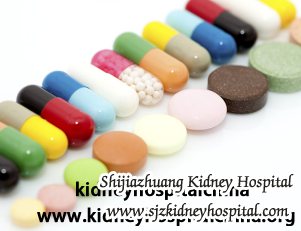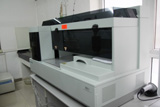Some Tips For Avoiding The Damage Caused By Taking Medicines
2018-07-25 14:08
 1. When you get the kidney disease ,firstly go to see a doctor ,then the doctor will prescribe some medicines for your condition.After taking the medicines your condition will feel relieved and comfortable,but with the time goes by you have taken more and more medicines ,and you can feel that your condition is getting worse and worse,Why? The following will explain the reason for you.
1. When you get the kidney disease ,firstly go to see a doctor ,then the doctor will prescribe some medicines for your condition.After taking the medicines your condition will feel relieved and comfortable,but with the time goes by you have taken more and more medicines ,and you can feel that your condition is getting worse and worse,Why? The following will explain the reason for you.
2. The prognosis of the disease is related to the drugs that caused the disease. It has been reported that anti-cancer drugs such as carmustine and smestin and some polypeptide antibiotics can produce irreversible or progressive renal damage.
1. Raise awareness of the disease: Pay attention to drug-induced renal damage to achieve early diagnosis and raise awareness of the disease. Because clinicians do not know enough about the renal damage caused by drugs, because kidney diseases caused by some drugs often lack characteristic clinical manifestations, and because kidneys have huge reserve compensation capacity. As a result, drug-induced nephropathy is not easy to be discovered early and even develops into irreversible end-stage renal failure. It is worth noting that some medicines for treating kidney diseases are inherently nephrotoxic. Therefore, we should raise our awareness of this disease and carefully observe and raise our vigilance during the treatment process. Early detection, early withdrawal and early treatment.
2. Understand the characteristics of the drugs used: Understand the characteristics of drugs and use them rationally. Clinicians should be familiar with the pharmacological and pharmacokinetic characteristics of large-dose contrast agents in order to avoid or reduce renal injury, and fully understand the renal toxicity and other adverse reactions of drugs in order to reduce the occurrence of drug-induced renal damage. Especially at present there are many kinds of new drugs. Clinicians often lack understanding of the internal processes and pharmacokinetics of the drugs used in combination with other drugs. As a result of improper use of drugs, doctors in some hospitals are more free to use antibiotics, especially some antibiotics that have nephrotoxic effects, and often use more than two drugs that have nephrotoxic effects in combination to increase the probability of renal damage. Clinicians should pay attention to strengthening the awareness of prevention of the disease, master the relevant knowledge of drugs, and use drugs rationally.
Then as a doctor you must estimate the treatment effect of medicine ,if the treatment effect is greater than its side effect to patients,then you can prescribe them for patients,otherwise you will tell patients to try another alternative treatment --Natural treatment with Chinese herbal medicine which has been researched by the kidney experts in Beijing Tongshantang Hospital of Traditional Chinese Medicine for many years.that has helped more and more kidney patients to recovery. If you want to know more about the treatment please contact us as the following message:
E-mail: kidneyservice@hotmail.com
WhatsApp: +8615512139310
Any kidney problems? Please consult our online doctor. The satisfaction of patient is as high as 93%.
What you also want to know:
How can I get this treatment ?
How can I get this treatment in my counties ?
How much is this treatment ?
What is the duration if I receive this treatment in your hospital ?
How can I go to your hospital ?
Tag: Natural Treatment Drug-induced renal disease Prognosis of the disease Anti-cancer drugs Polypeptide antibiotics Clinician Drug induced nephropathy
Pre: Which Parts Of Our Body Indicates Kidney Problem
Next: Chronic Nephritis Should Be Pay More Attention
Leave a Message
Any questions?Fill the form below and we will surely attend to you within 24 hours.Free medical answers from experts!
About Hospital
Patient Story
- The Key Point In The Course Of Treatment
- Drinking More And Urinate Frequently Means Kidney Problems
- How To Deal With Occult Blood With Correct Methods.
















